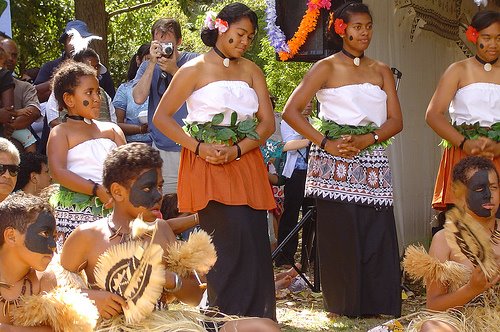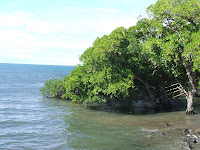 IN 1975, Agapito Muawalu was involved in a hit and run accident while returning from school one afternoon.
IN 1975, Agapito Muawalu was involved in a hit and run accident while returning from school one afternoon.A Class Two student of Holy Family Primary School, Agapito, who is crippled and blind as a result of the accident, cannot remember that tragic day in Labasa Town.
But he sure does know Catholic hymns as he was happily singing praises when we arrived at his home at Soasoa, outside Labasa Town.
He can recognise people from their voices, which was what happened when we arrived with community worker, Selina Lee Wah.
On hearing her greetings, he yelled with excitement: "Selina".
Agapito is 40-years-old and has been living with his 68-year-old mother, Valavia Ranadi, who is unemployed but is the sole bread winner in the home.
"I go fishing whenever I can because there is no one else here to provide our food or pay for our bills, Mrs Ranadi said.
"At times I go to the plantation while Agapito remains at home, usually in his bedroom singing hymns."
Since the accident, she has looked after her son in their two bedroom home that has no proper toilet and bathroom facilities.
"But I have managed. I thank God for giving me the strength to look after my son and help me move him around the house to have his meals or to have his bath," Mrs Ranadi said.
"After he was discharged from hospital, Agapito could still walk and run around and play with his friends.
"He even returned to school in 1975 but it was not long after that we had to pull him out from school because he started to get fits in the classroom," his mum said.
She said Agapito stayed at home with her and after a few months, his legs could not move anymore.
Soon after he could not walk anymore.
"That was the beginning of his physical disability.
"Agapito has to stay inside the house most of the time because he can not run outside to play with his friends.
"It was touching to see my son at that young energetic age sitting inside the house and watching his friends. All I could see on his face was how much he wanted to join them."
His mother said at the time although Agapito was crippled he could still see things around him and whenever he could, he would help his mum cook, cut up vegetables and clean the house.
In the afternoons he helps his mum around the house but keeps a constant watch outside to see his friends playing rugby.
When he became crippled at the age of seven, his mum started to carry him to the toilet and bathroom.
"I would carry him to the toilet day and night and to the bathroom to bath him.
"At that time it was easy for me because he was younger and lighter.
"Now whenever I call him to come and eat, I have to carry him from behind but at the same time he helps me by lifting his backside off the floor using his hands," she said.
In 1990, Agapito lost his eye sight on a beautiful sunny day when he was in the dining room with his mother.
His mum, who clearly recalls the day, said they were sharing jokes and laughter at home.
"Then suddenly he just went quiet and said, 'mum, I can't see anything, it's all dark around me' and that's when I knew that he had lost his eyesight.
"I took him to the hospital but the doctors could not do anything because he had already lost his eyesight.
"But life has been the same and we have enjoyed one each other's company.
"It's difficult at times but for the sake of my son, I have to do it. I will not put him in any institution because it is my responsibility as a mother to look after my child."














